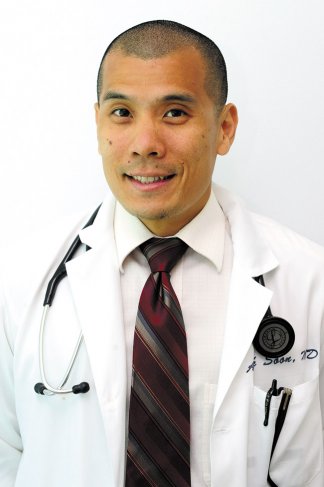When Hormones Start Dragging
Dr. Aleck Soon
Age-management medicine specialist at Asia Pacific Age Management Inc.
Where did you receive your schooling and training?
I was born in Hawaii and went to Mililani High School. For undergraduate, I studied at UH-Manoa, and went to medical school at John A. Burns School of Medicine. After medical school, I went to UCSF Fresno for internal medicine training, and I currently hold certifications in internal medicine and age-management medicine. I came home to begin practicing right after I finished my training in 2008.
What got you interested in age-management medicine?
Age-management medicine is a branch of internal medicine. What really attracted me is I see patients daily between the ages of 30 to 100 with chronic conditions such as diabetes, hypertension and heart problems. A lot of these hospitalizations could have been prevented if these patients had taken a more proactive approach toward health, nutrition and hormone replacement ― if they were guided by an age-management doctor. I am very passionate about fitness and nutrition, and a good advocate for my patients to help them remain young and energetic.
As men and women age, we start gaining weight around our midsection. A lot of us don’t eat right. We don’t have time to exercise. We are all very busy. And when we’re busy and we allow ourselves to not eat right and not exercise, we start developing fat in our midsections. Fat causes inflammation in the body, and research has shown that inflammation can lead to chronic problems in the future, such as diabetes, heart disease and strokes. Age management is a preventative, proactive approach to medicine to improve the quality of life by reducing the chance of developing chronic disease through diet, exercise and hormone replacement. The main male hormone is testosterone and the main female hormone is estrogen. Over time, we start losing these hormones, and when these hormones are deficient, men and women both develop similar symptoms. Women can develop hot flashes, men can develop mood swings. We have less drive and we start losing muscle mass and gaining weight. Age management helps focus and replace those hormones and helps mitigate chronic diseases and improve quality and function of life.
At what age do men and women start having lower hormone function?
Women can start having a decrease in hormones in their 30s, but in their 40s and 50s they start going through perimenopause and eventually menopause.
Men can start losing it at the age of 30. Up to 39 percent of men over 45 can start having testosterone deficiency. That’s about 2.4 million men a year. And some studies say up to 13 million men can have testosterone deficiency, but only 5-10 percent of men seek treatment for it.
What can people expect at an office visit?
During the first consultation we perform a full physical examination. We do a risk assessment about lifestyle, exercise level, nutrition, family history, current medical condition, current medications. Then we do an extensive lab check regarding hormones, kidneys, cholesterol, risk for heart disease, thyroid and hormones in both men and women to see if they meet criteria for hormone replacement.
Do bioidentical hormones enter into this discussion?
Bioidentical means that the hormones are the exact copy of your body’s hormones. We have a facility that makes bioidentical hormones, meaning they mimic your body’s hormones. And it can be through natural means, which are extracted from plants and they resemble the body naturally, or they can be synthesized by a pharmacy to be exact copies.
A women’s health initiative study in 2003 involved a huge trial with 10,000 women who underwent estrogen-replacement therapy. The study used a non-bioidentical hormone. Controversy arose from that because the estrogen they used was a mix of human and non-human, like horse estrogen. A lot of women did develop bad side effects from that. To avoid problems, a lot of age-management doctors are advocates of bioidentical hormones.
Where do steroids fit into this picture?
Testosterone is a type of steroid. When you hear about steroids in media regarding sports personalities, they’re using testosterone just like what we prescribe, but they’re using it at a level that is very high and can be dangerous. Age-management doctors use a dose that is appropriate. We follow your hormonal levels to make sure that you’re not getting too much or too little. Too little has been shown to increase risk for heart disease and worsening of function. Too-high levels can lead to heart attacks, strokes, blood clots and aggression. Age-management doctors focus on safe and effective optimization of hormone levels.
Steroids are hormones produced by the body naturally that help libido and help with strength. They also improve your overall function, muscle mass, weight loss and keep a person feeling in top shape.
Are there risk factors?
Not everybody will qualify for hormone replacement. There are patients who should not be on hormone-replacement therapy, such as women with a history of breast or ovarian cancer, men with a history or family history of breast cancer, men with bad sleep apnea, history of blood clots, or anyone with a recent heart attack. A risk and benefit profile is discussed with my patients before starting any therapy.
Anything else you’d like to mention?
For people who want to improve their health and they don’t feel the drive they had when they were 30 or 40, they should approach an age-management doctor. They also may see their primary doctor and have their hormones tested. Hormones can be replaced safely and effectively. When they do get them replaced, a lot of men and women feel the effects within one to three months. I encourage anyone who feels they may be hormonally deficient to set up a consultation with us.






